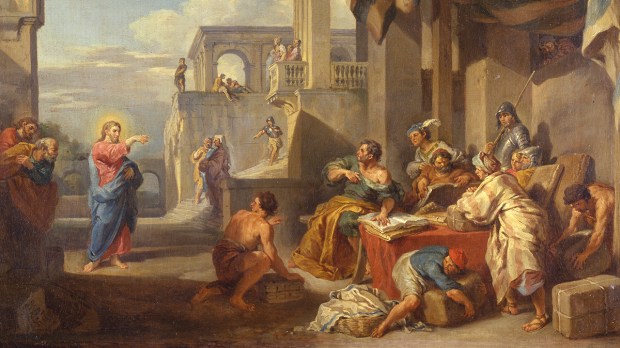Lenten Campaign 2025
This content is free of charge, as are all our articles.
Support us with a donation that is tax-deductible and enable us to continue to reach millions of readers.
When reading the Gospels, it doesn’t take long to see how tax collectors were viewed by the people. For example, Jesus, “sat at table in the house, behold, many tax collectors and sinners came and sat down with Jesus and his disciples” (Matthew 9:10).
Why is that?
Pope Benedict XVI offers an excellent summary in his general audience reflection on St. Matthew the Apostle.
Jesus welcomes into the group of his close friends a man who, according to the concepts in vogue in Israel at that time, was regarded as a public sinner.
Matthew, in fact, not only handled money deemed impure because of its provenance from people foreign to the People of God, but he also collaborated with an alien and despicably greedy authority whose tributes moreover, could be arbitrarily determined.
Furthermore, they see publicans as an example of miserliness (cf. Mt 5: 46: they only like those who like them), and mention one of them, Zacchaeus, as “a chief tax collector, and rich” (Lk 19: 2), whereas popular opinion associated them with “extortioners, the unjust, adulterers” (Lk 18: 11).
As a result, when Jesus invited Matthew to become his disciple, it would have shocked everyone around him. Jesus invited a “sinner” to become part of his inner circle.
This is good news for all of us, as Pope Benedict XVI points out.
A first fact strikes one based on these references: Jesus does not exclude anyone from his friendship. Indeed, precisely while he is at table in the home of Matthew-Levi, in response to those who expressed shock at the fact that he associated with people who had so little to recommend them, he made the important statement: “Those who are well have no need of a physician, but those who are sick; I came not to call the righteous, but sinners” (Mk 2: 17).
The good news of the Gospel consists precisely in this: offering God’s grace to the sinner!
When reflecting on the call of Matthew, we should see within it God calling us, sinners, to a personal friendship with him. Even if we think that God could never love us because of our sins, Matthew’s example reminds us that this is not true.
God always loves us and calls out to us, inviting us to walk with him, no matter how sinful we might be.



